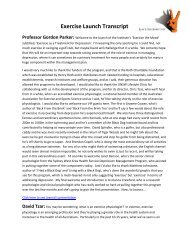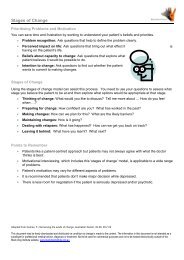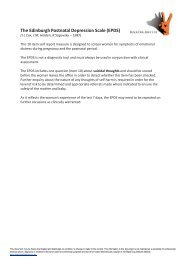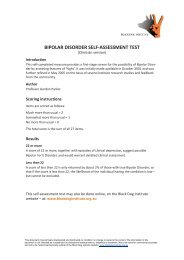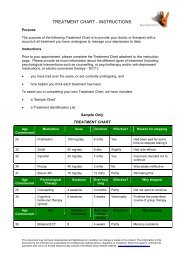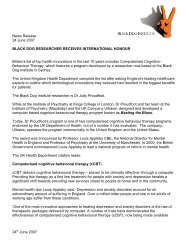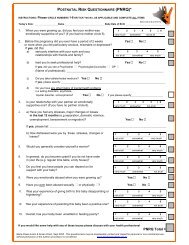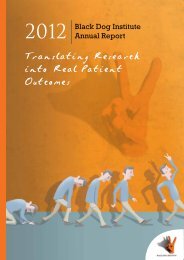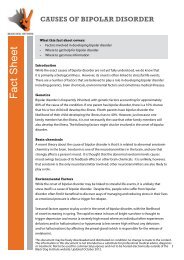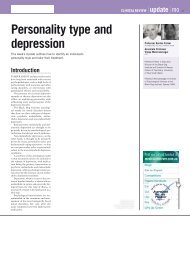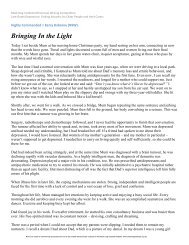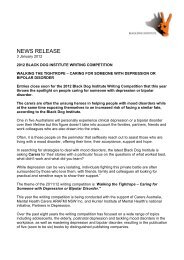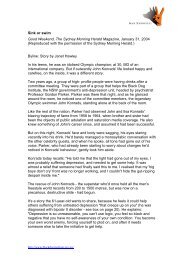The Casino Bipolar - Black Dog Institute
The Casino Bipolar - Black Dog Institute
The Casino Bipolar - Black Dog Institute
You also want an ePaper? Increase the reach of your titles
YUMPU automatically turns print PDFs into web optimized ePapers that Google loves.
it’s hard to imagine that seconds previously you were out in the light – cruising.<br />
Now you are at the mercy of others: triage nurses, doctors, parents. Together they are attempting to pull<br />
the wreckage from the water.<br />
I, like most sufferers, thought I would never drive again. <strong>The</strong>re were long months of sitting on the lounge,<br />
taking antipsychotics, and reading. No desires presented themselves. I slept often. I jumped through the<br />
hoops of the Early Intervention Program, rating my progress from one to ten: ten being normal Justin,<br />
minus ten being Justin in the mental health unit, and zero being Justin depressed at home, just out of<br />
hospital.<br />
That’s where the questions this essay tackles first arose. My Occupational <strong>The</strong>rapist had the most time for<br />
them. She visited once a week and asked me about my degree, my creative writing and my depression.<br />
I described the joy of the high and then the foolishness felt after getting out of hospital, when I realised<br />
that the experience was entirely false. It becomes worse if you get fooled a second time, like I did, and fall<br />
for it all again.<br />
<strong>The</strong>n I discovered that what I was mourning in my depression was really a feeling of creativity. <strong>The</strong>re was<br />
no work to show for the effort of losing my mind, no masterpiece to present to the world and confidently<br />
say ‘It was worth it’.<br />
Let me state categorically that neither being high nor being low are very good conditions for focused<br />
creativity. And by that I mean creativity that brings results, something to display for your toil.<br />
You don’t have time to work seriously when you are manic; what you have is time to daydream about your<br />
future exploits. It’s the equivalent of being on drugs, which for me also preceded both of my episodes.<br />
It took me until the second psychosis before I got the message. <strong>The</strong>re is a mantra my doctor, a specialist in<br />
bipolar disorder, gave me then. He said it worked every time. “If you want to stay out of hospital and lead<br />
a productive life, take your medication, sleep regularly and don’t drink or use drugs.”<br />
It’s a winning formula.<br />
My mind is clear: I calmly plan ahead: I can work every day. I’m motivated, in a healthy way. Getting<br />
high, on drugs or through mania, only ever stopped me from functioning; I got distracted, lost focus and<br />
became antisocial. <strong>The</strong> low was not worth it, either.<br />
You are unenthusiastic about work when depressed. You focus on gloomy things.<br />
Some say that a lot can be achieved by someone in the first stages of a manic episode. This is true, up to a<br />
point. But if you approach it from a purely mathematical position over a period of months, and add up the<br />
time lost in hospital, the time taken off work through depression, the missed opportunities when you have<br />
to leave employment and the relationships you can destroy with friends, family and workmates, it is<br />
actually an extremely unproductive way of accomplishing anything.<br />
If I wrote just one page a day for six months, remaining stable, it would be far better than trying to write a<br />
book in two weeks without sleeping and then ending up in a mental institution.<br />
Aside from that the emotional distress itself, for all concerned, should be enough to make a person not<br />
want to be sick.



